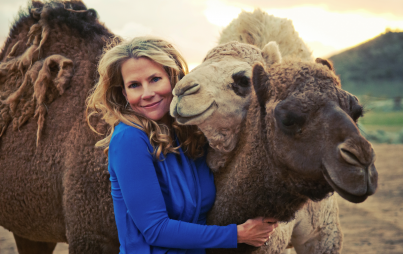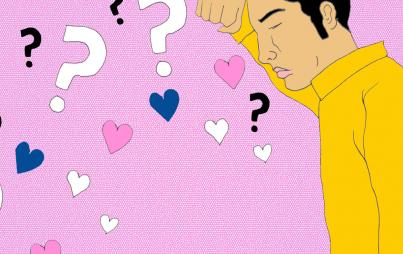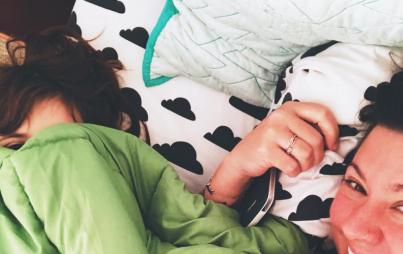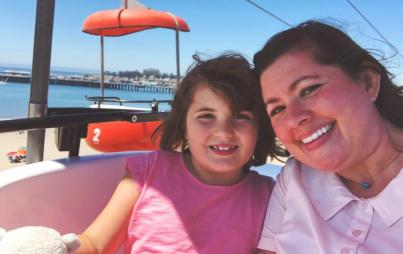
I did what anyone does when they think they might have something, but they’re not quite sure: I Googled “women autism symptoms.”
This article first appeared on The Refresh and has been republished with permission.
You ever heard the term fugazi? It’s Italian-American slang for a fake diamond.
I knew words like that growing up because I was precocious since infancy. I could speak in full sentences at 18 months, but only in Spanish. I absorbed everything, apparently. Even celebrities on TV. One night my father came into my nursery after working two jobs. Since he was rarely home when I was awake, I didn’t recognize him. And I started to cry.
“I’m your papi!” He said in Spanish.
And I shook my head and said, “No, you’re not.”
“Well, if I’m not your papi, then who is?” He asked.
And without skipping a beat or a moment’s hesitance, I replied, “Tom Selleck.”
My father laughed, I am told. I guess at that time everyone wanted a little Magnum, P.I. In their lives. I just happened to be his youngest fan.
By the age of two I could recite what happened on CNN that day. I was advanced by most calibrations. But I didn’t like loud noises or bright lights. I would throw fits if I was dressed in scratchy wool sweaters or itchy lacy socks. My mom noticed I had bad balance, so she put me in ballet, and I did well. She picked up on on my lack of eye contact. So we practiced it. 1. . . 2. . . 3. . . 4. . . 5. . . Not a frightening endeavor for some, but for me it was terrifying. My mom saw that I wasn’t stimulated at home. I would sit for hours in front of the TV, with my head cocked to the side and my mouth slightly opened. She decided it was time for preschool.
I excelled in preschool. I could read and write in English by the time I was four.
What I couldn’t do at all was get along with others.
I didn’t understand how they got along — how they negotiated for toys. All I knew how to do was hit kids hard– really hard. I almost got expelled for hitting kids. Life progressed that way for quite a while. I hated school. The kids didn’t like me and I was always alone. I woke up every morning with a pit in my stomach, a rock that rumbled every day and made my journey through childhood constant torture.
Then around seventh grade I wised up. I figured if I couldn’t be the real thing — a normal kid — I’d be the next best thing. A fugazi. Becoming a fugazi was sort of like taking up the mission from Star Trek. I was an alien emissary brought down to this planet to study the ways of your people and interact with you freely.
And it worked! I mean, it sorta worked. I was a cheerleader and on student council. I made a lot of friends who all turned out to be gay boys. But, that rock in my stomach never quite settled.
I got a boyfriend senior year of high school, and made more friends in law school. I got married and became a lawyer. My clients respected me. Alright, a lot of it was the power suit and pearls, but they respected me. That damn rock though was still there.
You Might Also Like: How Walk-It-Off Culture Delayed My Autism Diagnosis
At the age of 31, I remember sitting on the couch, watching TV, with my head cocked to the side, and my mouth slightly opened. There was a Bollywood movie on about a man with Autism called My Name is Khan. I was watching and wondering: do women ever get autism? I have two male cousins who are on the spectrum, but nobody ever talked about women on the spectrum.
I did what anyone does when they think they might have something, but they’re not quite sure: I Googled “women autism symptoms.”
Out came an overwhelming chart of about forty symptoms. I read the first one — “dresses comfortably for sensory issues and practicality.” Doesn’t everyone? The second — ”eccentric personality; may be reflected in appearance” — sounded familiar. By the eighth — ”may have savant skills or strong talents” — I felt like there might be something there. By the twentieth — ”may be highly educated but will have had to struggle with social aspects of college, may have one or many partial degrees” — I was a little freaked out by how many of the symptoms felt like me. And by the fortieth — ”moody or prone to bouts of depression, may have been diagnosed with bipolar” — I felt as if someone had been studying me this whole time and writing everything down.
Being a fugazi made diagnosis hard. I called up my psychiatrist and told her, “I think I might be autistic.”
“Vene,” she said, “you’re crazy.”
“That’s what I pay you for.”
“You’re fine. You make eye contact, you’re charismatic. You’re fine.”
But I wasn’t deterred. I called up my therapist and told her, “I think I might be autistic.”
“Vene,” she said. “You’re crazy.”
“THAT’S what I pay you for.”
“You’re fine. You’re just a bit on the nerdy side.”
But I was still undeterred. I found a diagnostician in town. And over the course of four weeks, she performed visual and written tests. She asked me a lot of questions. But mostly she just wanted to know what I was like as a kid. How did I play? At the end of four weeks she told me, “Vene, from week one I knew you were autistic.”
And there was that word: autistic.
I wanted to cry. Autism is a scary word, and I didn’t know if I was strong enough to hold it in my hands. But then I also wanted to cry because I’d been carrying that burden for 31 years, and I could finally put it down.
My life was split into before the diagnosis and after the diagnosis. There were some people, like my ex-husband, who rejected me. They couldn’t carry the burden. And then there were all the friends who didn’t understand how I’d faked them for so long by being a fugazi. I told them I learned to fake things a long time ago, and if they didn’t believe me, they could ask my ex about our sex life.
And then. . . and then there were the people like Dan. Dan is a special friend of mine. One night we were walking through the Village in New York and a fire truck came blazing around the corner with lights flashing and sirens blaring. I closed my eyes and covered my ears and began to rock back and forth. Suddenly, I realized that he was staring at me. I squinted out of one eye to see what he was doing, and I saw two hands coming to cover mine so the sound wouldn’t hurt. Those are the keepers.
The autism diagnosis was a godsend.
I feel free to be who I really am.
I wear comfortable clothes, I make eye contact when it feel right for me. I choose friends who appreciate my eccentricities. I talk about being autistic freely. I don’t have to be a fugazi anymore. If people don’t like me, there are plenty of others who do. What I’ve come to terms with is that the rock that rumbled for decades in the pit of my stomach was a piece of carbon. And with time and pressure, it formed into the hardest substance on Earth. My name is Vene. And I am a diamond. A real one.








